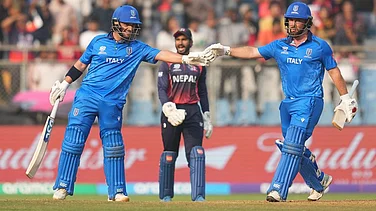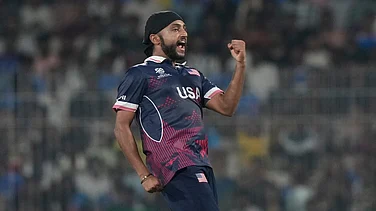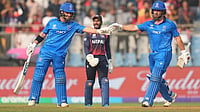Pele's demise just two days before the world prepared to welcome the new year and Lionel Messi-led Argentina lifting the World Cup trophy were undoubtedly the two epochal moments, which will be remembered for decades to come even as Indian football made more noise for its administrative mess than the on-field achievements in 2022. (More Football News)
If Messi worked his magic to guide Argentina to its third World Cup triumph on December 18, Pele's legion of fans kept praying as he battled cancer in a Sao Paulo hospital before he departed the world on December 29.
Fans in India shed tears of joy when Messi lifted the World Cup trophy, and cried inconsolably when Pele left, given their connect with the 'Beautiful Game'.
However, on the home front, things are far from hunky-dory even though global football icons are revered here and millions in the country tune in when the World Cup, Euros or the UEFA Champions League are beamed on the television screens.
The year saw Indian football go into a downward spiral with the All India Football Federation (AIFF) being banned by the world governing body FIFA for the first time in its 85 years history after it failed to conduct elections on time due to the callousness of the office-bearers, led by former union minister Praful Patel, who was ousted from office by the Apex Court.
The ban, which came a day after the country's Independence Day, was brief -- just 11 days -- and the women's Under-17 World Cup, which the FIFA had threatened to take away, was finally held in the country.
But the damage had been done as the sports ministry as well as the Supreme Court had to accept the terms laid down by the FIFA.
While the women's Under-17 World Cup did happen, India, who had qualified for the age-group showpiece by virtue of being the hosts, were thrashed 0-8 by USA, 0-3 by Morocco and 0-5 by Brazil in the group stage, which underlined the gulf in class vis-a-vis the top teams.
The gloom among Indian fans was, however, lifted when the 'greatest show on earth' began in Doha, the capital of Qatar where South Asians make up nearly 40 percent of the population.
The Arab region's first World Cup was truly memorable in every sense. The controversies in its run-up were forgotten quickly as on-field action was too rivetting to waste time on other things.
It was anybody's World Cup in the truest sense, though in the end Messi's Argentina beat Kylian Mbappe's France in the penalty shootout in a summit clash for the ages.
It was a World Cup of upsets. There were no underdogs and anybody could beat anybody. Football powerhouses like Germany, Spain and Portugal bit the dust, losing to Asian or African countries.
Eventual champions Argentina were stunned by Saudi Arabia in their opening match while runners-up France, without some their stars in the starting lineup, were beaten by Tunisia in the group stage.
Morocco made history, becoming the first African country to reach the semi-finals.
It finally turned out to be Messi's World Cup, as the stars aligned to give him the coveted trophy which had eluded him for so long. Argentina's triumph catapulted Messi, who also was adjudged the best player of the tournament, in the league of Pele and Diego Maradona as a claimant to football's GOAT.
Golden Boot winner Mbappe cemented his place as the one who could be football's next global superstar with a hat-trick in the final.
Another claimant to the GOAT status, goal machine Cristiano Ronaldo's World Cup dream ended in tears as Portugal lost to Morocco in the quarter-finals. Neymar, yet again, promised a lot but delivered too little as perennial pre-tournament favourites Brazil ended their campaign in the quarter-finals, breaking many Indian hearts.
The quadrennial festival, spanning a month, once again underscored the eminence of the 'beautiful game' in the world of sport.
Barely the heady euphoria of the World Cup had died down, football fans were struck by the news of King Pele's passing. The iconic three-time World Cup winner had a tumour in his colon removed in 2021 but his health condition worsened towards the end of the World Cup.
In India, most part of the year was more about controversies and administrative wrangles in the AIFF.
Following the FIFA ban, elections were held on September 2. A new set of office-bearers under former goalkeeper Kalyan Chaubey, who beat ex-India captain Bhaichung Bhutia in the presidential elections, took charge and promised a new beginning based on transparency, accessibility and hard work to take the game forward.
The year began on an ominous note as Covid-19 broke out in the India camp in Bhubaneswar competing in the women's Asian Cup. India failed to field a team in their second match with 12 players being infected by the virus.
It led to the continental body awarding the title to Chinese-Taipei, thus ending the dreams of the home side of making it to the 2023 World Cup.
The men's national team under Croatian coach Igor Stimac, though, provided the silver lining. India qualified for the Asian Cup for the fifth time after a convincing qualifying campaign in Kolkata in June. Stimac was retained by the new dispensation till the end of the Asian Cup in early 2024.
Captain and talismanic striker Sunil Chhetri, who was named 'AIFF Player of the Year' for the seventh time, continued his goal-scoring spree at the age of 38 years. He struck four out of the seven goals India scored in the Asian Cup qualifiers to remain the third-most prolific scorer among active international players after Ronaldo and Messi.
FIFA released a special video series on his stellar career.
Chhetri also led Bengaluru FC to his and the club's maiden Durand Cup triumph.
Another positive development was the decision taken by the new AIFF dispensation to implement the already agreed roadmap of the I-League winning team of this season. The winners will be promoted to the top-tier, Indian Super League, next season without having to pay the participation fee.
The new office-bearers also promised to start match-fee payment for the national team players, both male and female, and also decided to revive and revamp old tournaments such as the Santosh Trophy to give more competition to the players and increase the player pool.
It was also decided to hold the semi-finals and final of the Santosh Trophy in Saudi Arabia for three years from this season onwards to motivate the domestic players and give them an international platform.
Gokulam Kerala became the first team to defend the title in the I-League era. The Gokulam Kerala women's team also won the Indian Women's League, but they were hit hard by the FIFA ban of AIFF as they were removed from the Asian Women's Club Championships held in Uzbekistan.
Manisha Kalyan joined Cypriot club Apollon Ladies FC -- which featured in the UEFA Women's Champions League qualification round --, Dangmei Grace signed up with Uzbekistan Super League side FC Nasaf, while Soumya Guguloth and Jyoti Chouhan joined Croatia's Dinamo Zagreb.
India lost a few of the gems of yesteryears like 1956 Olympics semi-finalist team captain Samar 'Badru' Banerjee, Babu Mani and Narinder Thapa, among others.
India also withdrew its bid to host the 2027 Asian Cup, declaring that hosting of big-ticket events is "not among its strategic priorities".


























